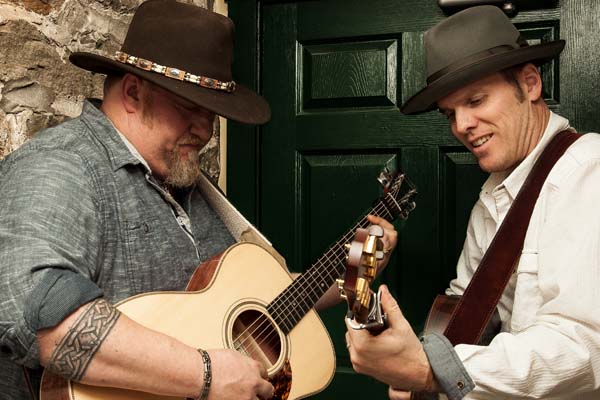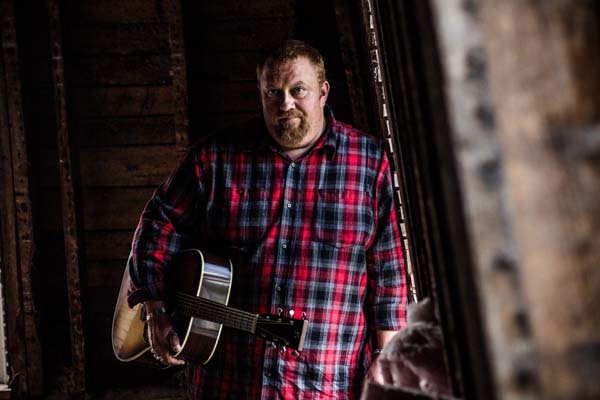How “The Little Drummer Boy” inspired one East Coast musician to give the gift of music
In the weeks before Christmas in 2019, acclaimed Nova Scotia musicians J.P. Cormier and Dave Gunning presented a series of concerts throughout the East Coast, taking the stage together to share their talents and their stories, combining skills with guitars, banjos and the fiddle with a banter that reflected their decades-old friendship.
Their set list mixed their own songs (the pair recorded an album together in 2017) as well as traditional Christmas songs, including “The Little Drummer Boy”. While introducing the song, Gunning revealed to the audience that this song makes Cormier cry.
Hard to imagine J.P. Cormier reduced to tears by a Christmas song yet his tough demeanour belies a profound appreciation for the words of that song in a way most of us miss.
“It’s the story of someone with nothing who contributes the most,” Cormier later explained. “It’s about somebody who is nobody, who is discounted—much as the song is. The underlying story is incredibly important.”
Through music, Cormier is familiar with the unexpected ways people can react to the lyrics of a song, but his life experiences also taught him not to overlook the ways in which we can help another person in need. Whenever he plays “The Little Drummer Boy”, especially now after nearly four decades in the music business, he channels a deeply-rooted belief in the gifts we give each other—sometimes without even realizing it.

Nova Scotian musical colleagues and friends J.P. Cormier and Dave Gunning. Cormier says that musicians offer everything they have to an audience, not always realizing how their songs make others feel—in much the same way as the little drummer boy.
John Paul Cormier began playing guitar when he was five years old and, at 16, moved to Alabama because he wanted to learn how to play bluegrass where it was invented. He became a session musician for various acts throughout the deep south, released his first studio album of bluegrass instrumentals, went to college in Mississippi to study music education, and at the age of 19, was “discovered” by the CBC who introduced him to a wider audience as a featured artist. He began working with Studio H in Halifax and was tasked with discovering other talent for the program Atlantic Airwaves.
By 1995, he was back home permanently in Nova Scotia, working as an East Coast musician but his time in the American deep south, where he was involved in a Pentecostal gospel ministry, left him with both a profound distrust of religion and a fascination with the historical Jesus. Now in his 50s, Cormier believes the actual message Jesus tried to tell people has been lost, but it’s the same message found in “The Little Drummer Boy.”
“It’s how that the person in the room who has the least of anything can overshadow everyone else in the room by giving something he doesn’t have to give,” Cormier said. “The drummer boy is in rags, doesn’t realize and maybe doesn’t even believe what these people are telling him (‘This is your king’)–and he looks around and sees that everyone else has gifts. The only thing he had was his ability as a musician so he decided he would play his drum and (that song) would be his gift. He does it and becomes acclaimed in the moment, higher than anyone there. He’s the only one that the baby smiles at.”
Cormier admitted that even talking about it over the phone had him choking up.
“It’s that emotional to me,” he said. “If we all thought the way that song implies we should think, the whole world would change. That’s why it makes me cry. Partly out of sadness at how stupid the world is, and partly because of the beauty of what that little boy did.”
The song also resonates because Cormier sees himself and every musician in those same shoes, offering all they have to an audience, and not always realizing how their songs make others feel.
“I’ve been lucky enough to find out how much positivity music can bring to strangers’ lives. People told me they heard “Another Morning” and called their estranged father for the first time in 25 years. Veterans called me and told me they saw “Hometown Battlefield” on YouTube and decided not to kill themselves.”
According to Cormier, “Music is the only thing in the world that is capable of altering a life’s path like that, of touching that many people in two or three minutes.”
That’s why he bristles when “The Little Drummer Boy” is dismissed as a silly Christmas song with no meaning.
“It has everything in it. It’s one of the only Christmas songs that addresses the actual human condition in relationship to who we think Jesus Christ was.”
For him, that’s the context of the commandment to love your neighbour.

“People have lost (the idea) that you treat each other as good as you can,” explained Cormier. “Every single person is in possession of something that is needed by another person, whether that’s a handshake or a kind word or a five-dollar bill. We forget that every single day of our lives; we forget our attachment to every other person in the world. We’ve become all about ourselves as individuals, so the world is in the toilet.”
He paused for moment, then added, “You want to know why it would take so much ink to explain why ‘The Little Drummer Boy’ makes me emotional—that’s why. It’s a huge topic.”
All that from a brief bit of good-natured teasing on stage with his buddy, Dave.
Those touring days seem like an entirely different lifetime for Cormier. When the COVID-19 pandemic shut down the world in March 2020, Cormier was forced to cancel all his shows, about 200 of them, and retreat to the sanctuary of his home recording studio outside Halifax, Ginger’s Barn (named after his wife of two years, who helped him build it and claimed the main floor for her woodshop).
In April, when Cormier began fulfilling his need to perform and connect with fans by posting videos to his YouTube channel, he discovered an audience eager to watch what he had to offer. He’s created a line of shows including an autobiographical chat called A Life In Music, a live Q&A called String Theory, as well as a Master Music Method online school.
That’s how Cormier came up with the idea for replacing the live shows that all musicians are missing. In late September, he posted a video to his Facebook page in which he announced his new venture.
“It’s early here in Ginger’s Barn, six o’clock in the morning, and I’m up, as I usually am, thinking about stuff,” Cormier said to the camera.
He sipped from a large mug of coffee.
“What’s on my mind today, and every day since this whole thing began, is how to move forward. Moving forward’s easy— Just get up in the morning and do what you do best. My main concern over the past six months is how do I translate this into two things: how to keep us afloat, even though we’re better off than many people; and how to translate this into a vehicle for other artists.”
His idea is a live show called Live At Ginger’s Barn because he has the room, gear, production staff and ability to provide a venue for musicians to perform to an audience. The idea is influenced by the variety music shows Cormier watched as a young musician, shows hosted by Don Messer, Tommy Hunter and Rita MacNeil, but by using Ginger’s Barn as the venue, he pays homage to one particular Maritime show.
“The whole idea of it for me comes from my love of the television show Up Home Tonight. It was a show set in a kitchen—literally. The ATV studio in Halifax looked like somebody’s old-fashioned kitchen with a wood stove. It ran for eight years and hardly ever drew from outside the Maritimes. What does that tell you about the talent here? We’re trapped inside a bubble with some of the best talent in Canada.”
For Cormier, the challenge isn’t finding musicians but how to pay them.
“I’m looking around at other artists in this region and they can’t get a payday anymore. I want to find a way so that everyone gets a decent paycheque, an industry-standard amount of money like you’d get from playing a festival or a large theatre. We proved back in April that doing broadcasts from Ginger’s Barn were lucrative. People have supported every single show we’ve done with the basic premise that if you like what you see, send us a few dollars.”
There are no tickets sold. For the live show, Cormier announces the act and the potential audience pays in advance by donation, a kind of “pay what you can”. Cormier knows the cost of each live show so when enough money is raised, the show is scheduled.
He’s counting on his belief in the goodness of people, and the spirit of a little drummer boy with nothing more to offer than his song, to keep the music flowing in a world that needs it more than ever.
